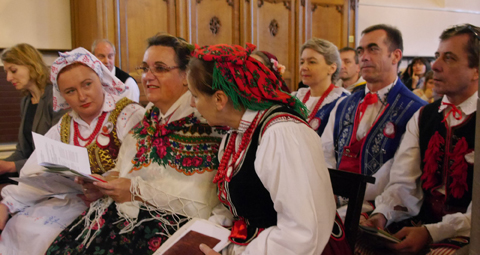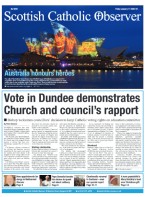January 11 | ![]() 0 COMMENTS
0 COMMENTS ![]() print
print

How Polish Catholics made a home in Scotland after WW2
The people of Poland who have made Scotland their home have made a huge contribution to the life of Church and community. Michael TRB Turnbull considers the difficulties many faced when they arrived as post-war refugees and how Faith communities welcomed them
LAST November, a Mass was celebrated in St Mary’s Cathedral in Edinburgh to mark the centenary of Polish independence.
Across Scotland, officials, politicians and authorities celebrated the occasion, with a statue to Polish Second World War hero General Stanislaw Maczek unveiled outside the City of Edinburgh Council chambers.
However, the positivity of the occasion masked the complex reality of post-war immigration to Scotland, and the frosty reception many Polish Catholics seeking a permanent home here were given by those in power.
During and after the Second World War, the Catholic bishops assumed pastoral responsibility for foreign nationals from many European nations, whose needs they tried to meet as appropriately as possible.
According to an apostolic constitution of Pope Pius XII (August 1, 1952), all foreigners, whether passing through (peregrinus) or newly-settled (advena) had the right to receive the Sacraments. Edinburgh in particular attracted many such foreigners, especially tourists, refugees and students.
Each ethnic grouping had its own characteristic cultural structure. The Polish community in the east of Scotland, for example, consisted not only of present or former combatants, but had, in 1941, set up the Polish School of Medicine at the University of Edinburgh.
At the end of the war, because of the British government’s Soviet connections, widespread resentment began to emerge at the presence of Poles in Britain.
At a meeting in Regensburg, Germany, the Allied authorities were determined to repatriate as many of the fiercely anti-Communist Poles as possible, while at the same time freely offering employment to other refugees such as men from the Baltic states, Ukrainians and Jews (the latter badly needed as building workers in Palestine).
Xenophobia
In Scotland, there also existed an ‘irrational xenophobia’ against Poles and their Catholicism. The Free Church Presbytery of Dingwall and Tain, for example, issued a vigorous protest in October 1946 at what they suspected to be the intention of the British government to settle Polish nationals in Scotland.
Part of the Presbytery’s objections was the high level of unemployment in the Highlands, but it also believed that the Catholic Church had been sympathetic to Fascism during the war and, more crucially, was convinced that the Vatican was promoting Polish settlement as a way of undermining the Protestant religion through ‘peaceful penetration.’
After the Soviets had taken over Poland, many Poles refused to return home, preferring instead to settle in Scotland. Although there were some attempts to integrate the Poles into Scottish society, the government also took steps to repatriate them forcibly.
In 1946, around 1,600 Polish students were supported by the Polish Interim Treasury Committee (responsible for the ministries of the Polish government in London); however, British government policy was to prevent Poles taking up UK vocational and technical training schemes; instead, Poles were to be trained under the auspices of the Polish Resettlement Corps.
At a heated Glasgow meeting in December 1946, attended by the archbishops of Glasgow and Edinburgh, Polish community representatives complained bitterly that the Labour minister of fuels and mines, Emmanuel Shinwell, had refused to employ 3,000 Polish miners in the pits, claiming that their poor grasp of English would be a danger to their fellow-workers.
Delegates at the Glasgow meeting also asserted that a number of other members of the Labour Cabinet were actively anti-Polish, an attitude they said was shared by the Communist leaders of many trade unions.
Other speakers at the meeting reported that there were around 10,000 Poles still living in appalling conditions at four Scottish camps. The reaction of the archbishops was that ‘the whole issue was not political but moral.’
They proposed to discuss the matter with the English Catholic hierarchy and make representations to the Foreign Office and the Prime Minister, Clement Attlee.
Perhaps the most poignant example of the mistreatment of the Poles was the potent symbolic presence in Scotland of General Maczek, former commander of the 10th Armoured Cavalry Brigade, victor of important battles near Montbard and on the Burgundy Canal.
Post-war
After the war, Maczek was ignominiously forced to make ends meet by working behind the cocktail bar of an Edinburgh hotel—unlike his British fellow-Generals, receiving no military pension from the government.
This was construed by Poles as a calculated insult to the Polish community, some of whom considered that Maczek would have made a first-class instructor at the Army Staff College, had he been offered such a post.
Apart from this isolated but high-profile instance of degrading treatment from the authorities, the Poles as individuals were, on the whole, well received by the ordinary people of Scotland.
Examples of physical violence against Poles were few, the worst being an incident at Irvine in September 1946, which involved servicemen from a local repatriation camp.
Eventually, the employment of Poles was reluctantly accepted by British organised labour and the political terror in Poland and the Cold War in due course also reduced admiration for the Soviet Union.
At the 1951 census, there were 10,603 Polish-born people in Scotland (9,113 men and 1,490 women): of these, 1,200 lived in Edinburgh (895 men and 305 women). Glasgow, had 1,164 Polish-born.
Because of the wartime importance of Edinburgh and its wide range of educational provision, a considerable number of professional soldiers and intellectuals settled there, founding community institutions aimed at preventing Polish traditions being swamped by Scottish culture.
Outside Edinburgh and Glasgow (in both of which Polish men outnumbered women by around three to one), the reverse was the case.
Very few Polish women lived outside these two cities and so most Poles married Scots women—such Scottish-Polish unions helping Poles to adjust to life in Scotland and to be accepted by Scots; many Poles even went so far as to stop taking part in organised Polish community activities.
It is to the credit of the Scottish Ukrainian community that they supported their Polish colleagues in the 1950s, when Poland was still in the grip of Communism.
After a meeting in Edinburgh in 1953 to protest at the imprisonment of 1,000 Polish priests and 15 Polish bishops (including Ukrainian bishops and priests), Father Matyczak, a Ukrainian Catholic parish priest in Scotland, thanked Archbishop Gordon Gray. He said: “We were glad to be able to be present with other people of our Faith at the Public Meeting of Protest organised by the Scottish-Polish Society, and listen to your impressive words… We deeply sympathise with our Polish neighbours whose bishops and priests and whose Primate Cardinal Wyszynski have been imprisoned by the Polish Communist government.”
The Ukrainians (of whom there were some 30,000 in Britain) found sympathy from Scottish Catholics and also from the Church of Scotland. In 1964, Fr Matyczak, looking to buy premises for a church, described to Archbishop Gray the co-operation he had received from the Rev James W Robertson of the Pilrig-Dalmeny Street Church of Scotland in Edinburgh.
Fr Matyczak said: “When I saw him [Rev Robertson] yesterday morning he was good enough to introduce me to some of his church elders who have expressed a genuine pleasure for having sold this property to our community for religious purpose.”










